|
DISC 13 [DVD]: Alan Clarke Half-Hour Stories
A woman runs in to a London arboretum to shelter from the rain and immediately attracts the unwanted attention of a man sitting inside. From the moment they first speak, it's clear that the two are from very different backgrounds and have personalities to match – she is the middle-class wife of a Norwich advertising executive, while he is a working-class manual worker from up North. He is brash and inquisitive about the woman's background, but she finds his questions discomforting and clearly wishes he'd leave her alone.
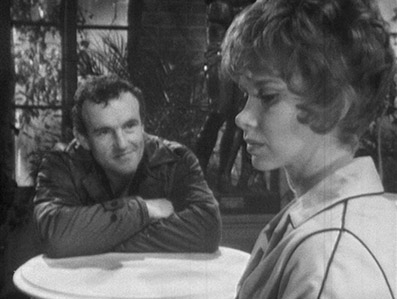
What starts as a seemingly straightforward case of an aggressive male harassing a vulnerable female soon evolves into something more complex, as the man grills the woman and hones in on small things in the manner of a police detective cross-examining a suspect, using his self-educated command of the English language to keep one step ahead of any possible response. He becomes, in effect, a bullish psychiatrist looking to uncover the root of an unhappiness the woman is doing her best to suppress.
Written by Alun Owen, Shelter is a compelling two-hander that excites in its use of language, exploring the nature of class division and personal power-play in a fascinating and sometimes discomforting manner. The lead performances from Colin Blakely and Wendy Craig are terrific (a couple of small stumbles are deftly worked around), and despite being his first time in the director's chair, Clarke makes piercingly effective use of the facial close-ups that were to become a signature of his early TV work.
| The Gentleman Caller (1967) |
Slarek |
|
Recently unemployed and mentally challenged Ged (Tony Selby) lives with his aggressive and out-of-work brother Clack (Mike Pratt), who is threatening to throw him out if he doesn't soon cough up for his 'lodge'. When social security officer Hicks (George Cole) turns up at their door to assess Ged's eligibility for National Assistance, Clack becomes angry at the man's officious nature and judgemental attitude and refuses to let him leave. What starts as intimidation takes a dark turn when Clack announces that he intends to kill his unwelcome visitor.
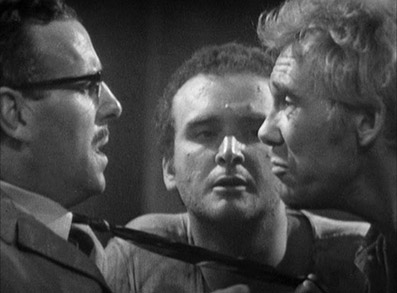
Written by Roy Minton, who later worked with Clarke on Horace, Funny Farm and Scum, this takes the power-play in Shelter a discomforting step further, as a representative of the system that is able to decide on the basis of a few hastily asked questions whether a person should be allowed money for rent or food gets to experience, just for a short while, what it's like to live with the sort of fear that some of those at the receiving end of his decisions experience every day. But it's not that cut and dried, as while it's clear that Hicks is in need of a lesson in humility and empathy, Clack is a genuinely unpleasant individual of the sort that I'm guessing a good many of us have been threatened by over the years, and exactly the sort of person the likes of the Daily Mail would point at in their seemingly never-ending campaign to demonise the welfare system. But this refusal to paint characters in black and white terms makes for far edgier and more interesting drama, and facilitates a second half whose tension builds to a genuinely nail-chewing pitch, intensified by three excellent central performances and Clarke's claustrophobic use of facial close-ups and frame-filling three-shots.
| Goodnight Albert (1968) |
Slarek |
|
Cheerful young mine worker Albert (Victor Henry) arrives back from his shift to the house he shares with his Gran (Gwen Nelson), whose husband and son were also miners and who both died of pit-related causes. As the two converse – first in the kitchen and later from their respective beds – it becomes clear that the grandmother wants Albert to leave the mine and take a factory job, which would offer more sociable working hours and less risk of being injured or killed, but Albert doesn't fancy the cut in pay. His furtive plan to take a girl away for a dirty weekend, meanwhile, can't help but remind Gran that sooner or later he'll leave her to start a family of his own, despite his cheery reassurance that she's the only girl for him.
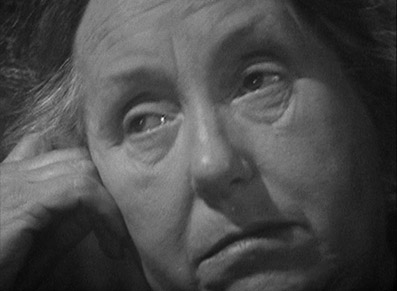
A structurally simple and dialogue-driven character piece from Roy Minton that is layered with detail and sly social commentary – occupational choices for this family are restricted to mine or factory work – while the friendly banter between Albert and Gran revolves around the circle of family life and the changing nature of generational values. Clarke, meanwhile, again makes emotive use of facial close-ups, but here also experiments with some unusual and unexpected camera angles. A brief thoughts voice-over comes close overstating what the dialogue conveys with more finesse and the chances are you'll see the ending coming well before the credits roll, but this is still a thoughtful, well acted and inventively directed work, albeit one that will leave you feeling sad and – one would hope – just a little self-reflective.
Seven days after Stella (Geraldine Moffat) walked out on her boyfriend (Ray Smith), he turns up at her attic flat looking for reconciliation. She's not interested in going back but he refuses to leave, and after a heated debate on nature of their relationship he takes a more physically aggressive stance.
One of a two Half Hour Story plays written by Alun Owen, directed by Clarke and starring Geraldine Moffat (the other was George's Room), Stella sharply dissects the relationship between the two leads by chronicling its death throes. As ever with Owen and Clarke, the dialogue and its delivery are crucial elements here, and the sometimes delicious banter between Stella and her boyfriend (who is never named) proves both revealing and the source of potential misdirection.
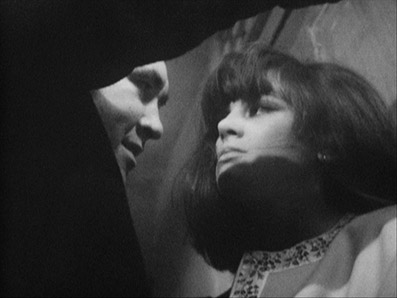
The man clearly regards Stella as a possession rather than an equal, an object for him to use when the mood takes him that he expects to be present and available at all times. He clearly has the physical strength to enforce his will should he choose to do so, but apparently runs home to mother whenever things get a little tough. Initially this all suggests that Stella has escaped an abusive relationship, one that she has become used to and that seven days apart have enabled her to see with the clarity she needed to make a permanent break. But as the argument between them peaks with a physical confrontation, with which Stella ultimately cooperates, there's a sneaking suspicion that this is how these two get their rocks off and that this is probably one of many such bust-ups and that they always end in a bedroom reconciliation – only in the final five minutes do we get a clear picture of Stella's true feelings and intentions.
Tight facial close-ups are once again Clarke's key weapon of choice, and in common with his other collaboration with Owen and Moffat, he again shoots favouring looking up at his characters rather than matching their eye-lines. Most striking are the shots in which the man is framed wide behind a foreground dominated (no pun intended) by Stella's thighs, which have just a whiff of a particularly famous image from the previous year's The Graduate.
| The Fifty-Seventh Saturday (1968) |
Slarek |
|
Rotund, married and middle-aged McCarthy (Ronald Fraser) keeps his regular Saturday liaison with his young mistress Mavie (Frances White), who is deeply in love with McCarthy and pines for a day when he might leave his wife. She had dreamed that they might do something special for her twenty-seventh birthday and pleads for him to arrange a fake business trip so that they might spend just one night together away from her flat, but McCarthy is clearly terrified of the potential consequences if such an endeavour was exposed.
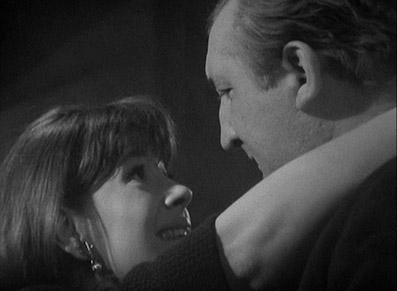
Very much a character and dialogue driven piece set over the course of a single Saturday afternoon, the relationship here has all the surface hallmarks of a classic extra-marital affair, with one party dissatisfied with the single afternoon they manage to sneak each week, and the other reluctant to go the whole hog and just leave his wife and be with a woman who would do just about anything for him. What, we are prompted to quietly wonder, is holding him back? Is he afraid of the upheaval that would result from him leaving his wife for Mavie, or of the conflict that would result when the affair was revealed? Is he actually content with the woman he married and just enjoying the occasional bit of excitement on the side, or is Mavie just a little too clingy for him to commit to her fully?
This is another solid two-hander, this time from screenwriter William Trevor, in which Clarke makes emotive use of facial close-ups and gets fine performances from Frances White and Ronald Fraser as Mavie and McCarthy. And all is not quite what it seems here, leading to a final revelation (or is it?) that answers none of the above questions and actually poses a couple more.
Retired professional thief Tony Grand shows up at the hotel room door of an elegant socialite and reveals that he stole her cigarette case at a party earlier that evening. She invites him in and over the course of a friendly conversation, the two attempt to scope each other out. But is Tony using the theft to get closer to a woman he has taken a shine to in order to set up a more complex crime, or does he think he has found a kindred spirit?
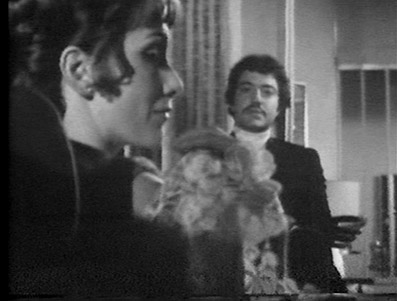
Alun Owen is back in the writer's chair for yet another two-hander in which the characters gradually reveal things about themselves to each other over the course of carefully crafted conversation, suggesting as much by what they infer or convey in their body language as they do with their words. Clarke's penchant for facial close-ups and offbeat angles is put to good use here, and the teaming of the laddish Alan Lake with a self-confidently elegant Siân Phillips, coupled with just a whiff of sexual tension, makes for consistently intriguing viewing.
I don't have the full facts here, but on the evidence before me it looks very much as if all of the Half Hour Story plays here were shot on monochrome video on studio cameras and then some of them – perhaps all – were transfered to film either for storage or editing or both. Certainly each has a video look and the plays themselves appear to have been captured by multiple cameras, but on Shelter there are a couple of vertical scratches and a number of dust spots, the sort of thing you find on film but not on video tape, and on Stella I could swear I spotted a few cement edit joins. All are very watchable nonetheless, though I'm guessing the lower resolution of the recovered image is what prompted the BFI to make these available on DVD only. Contrast is good within the restrictions of the medium and the level of detail is better than expected. Even the soundtracks are reasonably clear, if a little range restricted.
The exception to much of the above is Thief, which has clearly not been stored with the sort of loving care it probably deserved. It's still very watchable and you never have to struggle to understand the dialogue, but there's a horizontal scratch running across the lower part of the screen throughout, and some over-sensitive auto-levels at one stage of the production or storage sees the background sound rocket in volume at the start and assault the eardrums with some serious hiss and crackle. The fact that we are able to see and hear this at all is good enough reason to live with it.
| general extra feature: 196-page book |
Camus |
|
This is a first class accompaniment to this extraordinary box set. Each synopsis/critique/essay compliments the films included with all the contextual information you might need, to squeeze the juice out of each work. Any dramatic presentations from decades past are going to suffer in one way or another despite their artistic worth and credentials. This booklet enables you to head the more damaging ones off at the pass. "I hate that cliché!" I suggest accompanying the accompaniment with Richard Kelly's book on the man titled simply Alan Clarke then between the two volumes at least you'll be informed and hugely entertained. Having filled myself with all facts Clarksian over the last three weeks, I find myself idly wondering what a night out with Clarke and Olly Reed might have been like. Maybe those two glories of 'life-by-the-scruff-of-the-neck' scruffs would have cancelled each other out. No… I don't think so either.
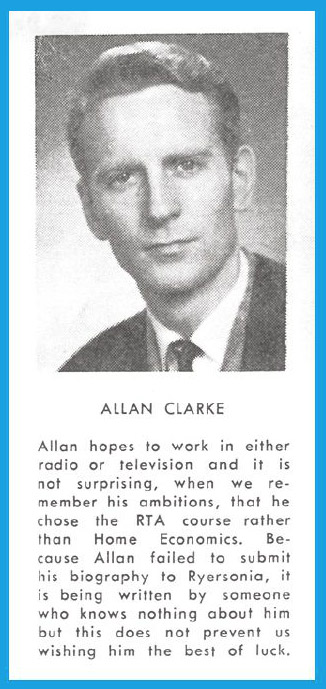
It's also a thrill to see well-known faces in the bloom of their youths (hullo John 'Munchausen' Neville!) in some of the publicity photos that the good folks at the BFI have managed to unearth. Even seeing rare pictures of Clarke at play and in action is a delight. I loved the yearbook photo (everyone looked so staunchly conservative in those sorts of shots) and the text is screamingly funny… It's typical Clarke before he became anyone to be typical anything. Minder's George Cole said of his working with Clarke before he started at the BBC that it was his "…most exciting and happiest experience of acting." I see playwright Dennis Potter's name as a reviewer on page 89. It gives me a warm glow to know that Clarke was appreciated by a man who too would become such a giant in the world of television drama.
If there is the smallest hic-cough in the text, it's in the essay on The Last Train Through Harecastle Tunnel. There is an appallingly stereotypical 'effeminate gay man' in this film, something anyone could not fail to mention in any review. You can blame the 'times' for a lot of this characterisation but Alex Davison, web producer for the BFI, writes "The laugh-at-the-silly-poof humour, the fault of Davis' interpretation rather than Terson's script, is a rare moment where the play shows its age." While I can agree with some of that statement, letting Clarke himself off the hook seems way too generous. It's not as if this entire box set is all about him… Directors should generally be responsible for the direction of the actors. If Griffith Davis played it that way, it's a safe bet he did it with Alan Clarke's blessing. The fact that his performance stayed that way should tell us about the period and the direction but not just the actor. But, ye gods, it's excruciating to watch in 2016.
Camus: I shall leave the last words up to Slarek who's responsible for the lion's share of this mammoth outpouring and that herculean effort has been up against some significant personal strife. But I will say this. It is crucial, now more than ever, that we reinstate or rediscover what are known as 'tastemakers'. It's as odd an unpaid occupation as it seems to be in 2016, a job that expects certain informed and experienced individuals to eke out that which is of artistic value so wheat on one side, chaff on the other – with chaff still available should you so desire to wade through it. It's still a crucially important job. It's a role that has diminished as swiftly as the digital seas have engulfed the arts (and in that I include film and TV). It's like trying to promote a small shoal of fish in a vast ocean of content. Alan Clarke worked during a tumultuous period of British history and represented those long without a voice of their own. The fact he found his own voice making wonderful films is something to be celebrated. But the further fact that someone – or a collection of industry insiders I suspect – acted as tastemakers and elevated Clarke's craft to the heavens, is also worth celebrating just as enthusiastically. This box set is heaven sent and congratulations to all those at the BFI and beyond who have made this a reality. Thank you.
Slarek: What more is there to say? Never in my most fanciful dreams did I ever envision seeing a box set of Alan Clarke's work as complete and ravishingly as this. The BFI have not just gone the extra mile here, they've swum twice around the world and then gone for a jog up the side of the Eiger, and still found time for a hundred press-ups later. Yes, this is at first glance an expensive purchase, but you can knock a third off the £150 retail price with a bit of judicious shopping around, and just look what you get for your money – every surviving film that Clarke made for the BBC and a few that he didn't, (almost) all restored and remastered in HD and resplendent with consistently superb special features, including a gorgeously produced, 196-page book that does everything this insanely long review tries to do but in considerably more detail. This is not just the best box set of the year, it's far and away one of the best I've ever encountered from any distributor, anywhere. Sell your car, sell your jewellery, sell your family if you have to, and buy this magnificent and lovingly produced release.
|